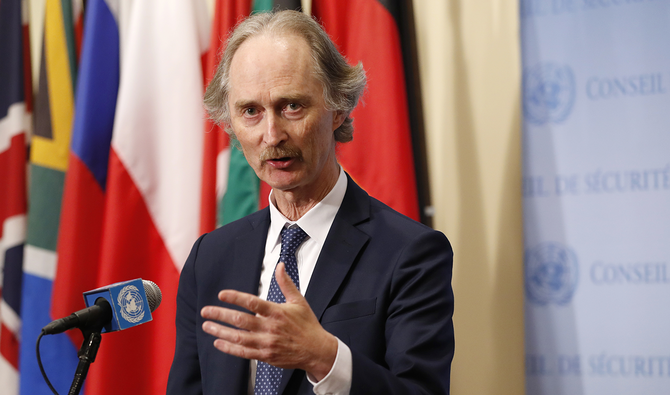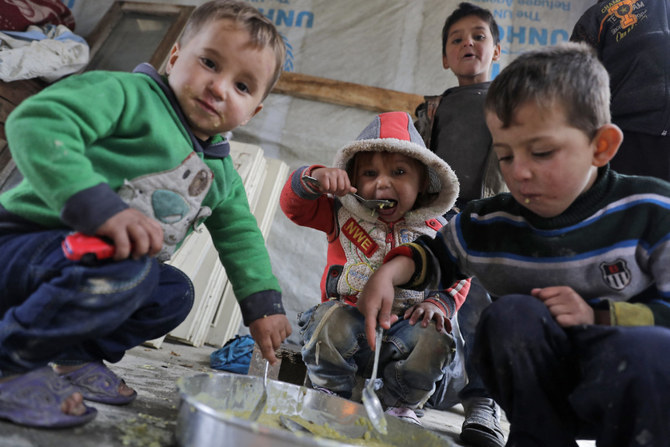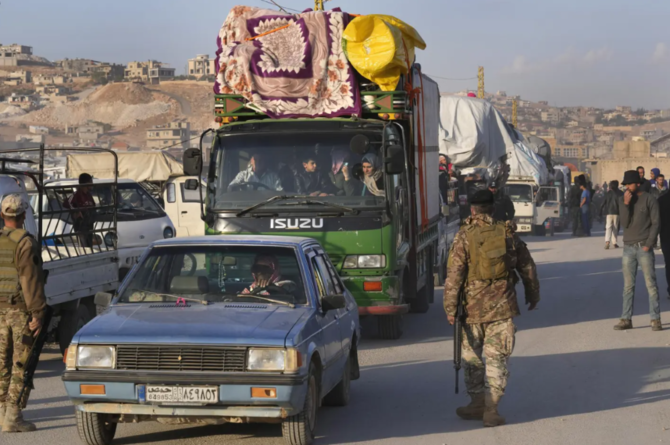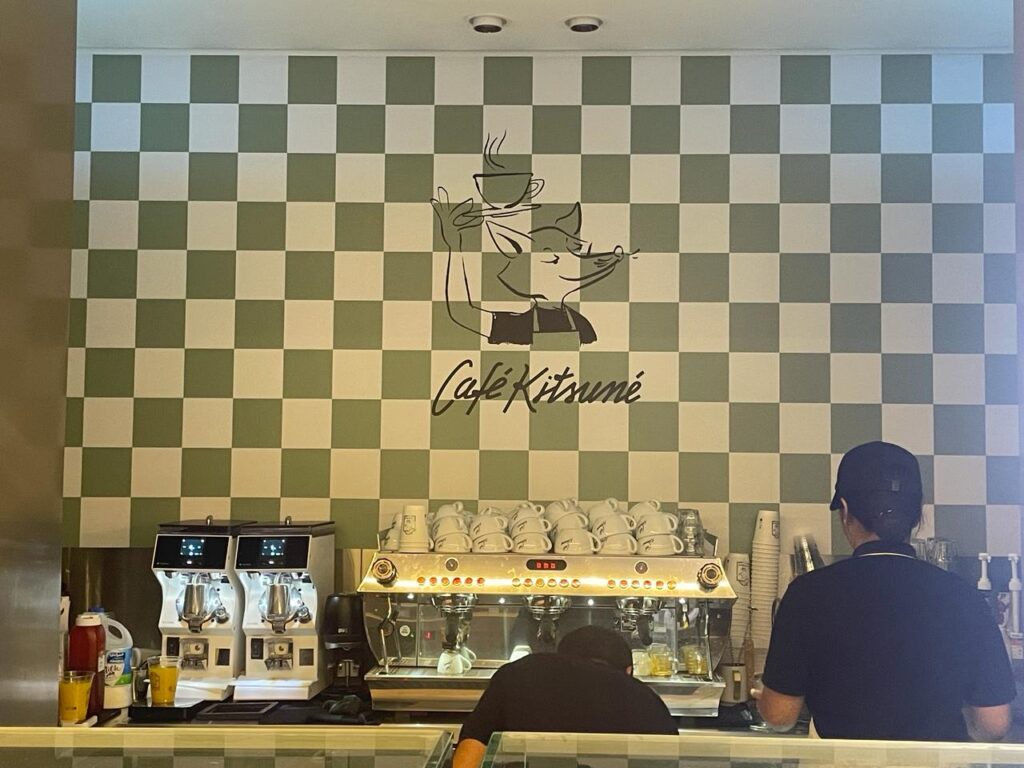Ephrem Kossaify
NEW YORK: Emotions ran high during a meeting of the UN Security Council on Wednesday, as permanent members traded jabs and accusations.
It came as Geir Pedersen, the UN’s special envoy for Syria, and Mark Lowcock, under-secretary-general for humanitarian affairs and emergency relief coordinator, delivered the latest sobering warnings about the plight of the Syrian people, after a decade of death and destruction caused by the Civil War.
They urged the international community not to turn its back on Syrians and the humanitarian crisis they face.
Bashar Jaafari, the former Syrian representative to the UN and the country’s deputy minister of foreign affairs, blamed the situation on Western nations. He accused them of “pillaging Syria’s wealth” and launching “unfounded accusations” against the regime of Syrian President Bashar Assad, and said the West promotes violence and hate and perpetuates the spread of “terrorism without borders.”
He also accused Western countries of employing double standards, and suggested that if the Jan. 6 attack by a right-wing mob on the American Capitol had happened in a non-Western country, it would have been labeled a “Spring,” an “Orange Revolution” or an expression of freedom. But “because (it) happened in a Western capital (it was) condemned by the world,” he said.
Jaafari also directed allegations of “terrorism” by Turkey toward his counterpart from the country, who refused to respond on the grounds that “he (Jaafari) is not a legitimate representative of the Syrian people.”
The meeting was convened at the request of Tarek Ladeb, the permanent representative to the UN of Tunisia, which holds the presidency of the Security Council this month. It took place as the Syrian Constitutional Committee prepares to gather for a fifth round of talks in Geneva next week under the auspices of Pedersen.
The committee is a part of a UN-facilitated process seeking a reconciliation between the Assad regime and the opposition through changes to the existing constitution or the drafting of a new one.
Almost 10 years of war have left millions of Syrians “with deep trauma, grinding poverty, personal insecurity and lack of hope for the future,” Pedersen told the Security Council. “For many, the daily struggle just to survive crowds out most other issues.”
He said the COVID-19 pandemic, the spillover from the crisis in Lebanon, and internal factors such as war economies, corruption and mismanagement have combined to create “a slow tsunami that is crashing across Syria.”
He stressed the need to ensure that any additional sanctions imposed on the Syrian regime must avoid escalating the plight of the Syrian people.
While he said it is true that the past 10 months have been the calmest since the beginning of the conflict, Pedersen added that military escalations in the northeast continue to disrupt this relative peace, along with Israeli assaults, continuous
Daesh attacks, mutual shelling and airstrikes in Idlib and unrest in the southwest.
Attacks continue to cost lives, he said, and Syrians face a host of other threats including abduction, arbitrary detention, increased criminal activity and the intensification of terrorist attacks.
“This is a fragile calm (that) could break down at any moment,” said Pedersen.
He acknowledged that the political process has not resulted in any tangible changes as yet, nor any real vision of the future for Syrians, but stressed the need to persist with confidence-building measures such as unhindered access for humanitarian aid groups, an enduring nationwide ceasefire, and access to detainees.
While free and fair elections, based on the provisions of Security Council Resolution 2254, still “seem far into the future,” Pedersen said that “more serious and cooperative international diplomacy “could unlock genuine progress and could chart a safe and secure path out of this crisis for all Syrians.”
Lowcock painted a grim picture of the humanitarian crisis in Syria. He told the council that Syrians are dealing with severe levels of food insecurity, along with fuel shortages and power cuts during a harsh winter, and a growing dependency on child labor.
Bad weather is forcing people to “spend entire nights standing up in their tents due to rising flood waters,” Lowcock added, and he warned that a new wave of COVID-19 infections could also be imminent.
He highlighted the desperate conditions in the notorious Al-Hol refugee camp, which is home to thousands of wives and children of former Daesh militants. There has been a surge in violent incidents there in recent months, but he said security measures must be employed without endangering the residents, violating their rights or restricting humanitarian access.
Most of the 62,000 people living in the camp are below the age of 12, he said, and “growing up in unacceptable conditions.”
Lowcock reiterated the UN’s commitment to providing humanitarian assistance but said it requires “adequate funding, improved access and an end to the violence that has tormented Syrians for nearly a decade.”
In her final statement to the council, Kelly Craft, the departing US ambassador to the UN, choked back tears as she shared tragic stories from Syrian refugee camps she visited in Turkey, and pleaded for the world not to abandon the people of Syria.
“Wake up to the horrors of this conflict” and take action to restore peace, she said.
“Bombed, starved, displaced and tormented by the Assad regime and its supporters, (these) are the people, the majority of whom are women and children, who have entrusted us in this council to keep them safe — to keep them alive,” she added.
Craft condemned the “political dynamics that afflict this council and continue to deny the Syrian people a path toward peace, stability, and hope. This council is failing millions of civilians of Syria, not just today but for more than a decade. It is appalling.”
She accused the Assad regime of deliberately stalling the progress of the constitutional committee to distract the attention of the international community from the thousands of civilians killed or injured by the regime “and its craven allies’ barbaric attacks,” as it gears up for “a sham presidential election this year.”
She added: “Any such election would be illegitimate (and) the US will not recognize (it.)”
Craft said any election must ensure the participation of Syrians who are refugees, internally displaced or part of the diaspora, and reiterated that the US will withhold reconstruction funding until the UN’s political process in Syria is complete.
She berated her Russian colleagues who, she said, “tell a very different story (about Syria) to this body — a story breathtaking in its dishonesty and cynicism.”
After wishing Craft well for the future, Vasily Nebenzya, Russia’s ambassador to the UN, said: “I will now turn to the Russian story on Syria.”
He criticized the UN for “keeping its mouth shut” while the proceeds from Syria’s natural resources “are not flowing into Syria’s coffers.” He also defended the Assad regime, saying that “Damascus is doing everything it can to keep the economy afloat” while international sanctions cause it to collapse.
UK Ambassador James Paul Roscoe rejected this suggestion and said the true cause of the tragedy in Syria is the regime’s “nepotism, corruption and brutal attacks against its people.” He called for the regime to be held accountable for its crimes.
Pedersen reiterated that the UN’s resolution on Syria stipulates that the political process in the country “must be Syrian-owned and led, but the conflict is highly internationalized, with five foreign armies active in Syria.”
The world cannot, therefore, “pretend that the solutions are only in the hands of the Syrians, or that the UN can do it alone,” he added as he called for “a more serious and cooperative international diplomacy.”






















